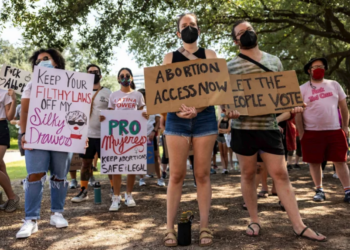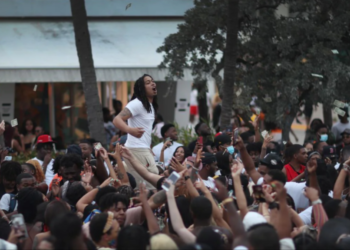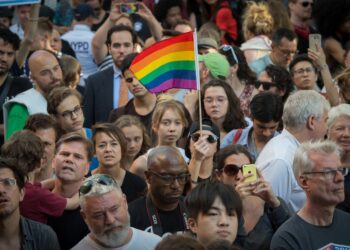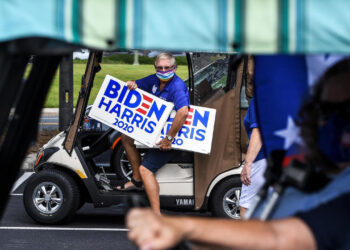When voters in Florida go to the polls this November, they’ll have the opportunity to restore the voting rights of 1.4 million of their fellow citizens who are disenfranchised because of a felony conviction.
Roughly one in ten people in Florida have been stripped of their right to vote because of their criminal record, the highest proportion of any state.
Amendment Four, an initiative that will appear on the ballot on November 6, seeks to automatically restore the voting rights of felons after they complete parole and probation. The proposal – currently polling at over 70 percent favorability – excludes those convicted of murder or sexual offenses.
The impact of felony disenfranchisement is felt disproportionately by people of color. In Florida, a striking one in five black adults has lost the right to vote because they were convicted of a felony at some point in their life.
“The curve of people impacted by felony disenfranchisement mirrors the curve of people impacted by mass incarceration,” Nicole Porter, the Director of Advocacy at the Sentencing Project, told The Globe Post.
While most states restore the voting rights of felons after they complete their sentence, the issue of felony disenfranchisement is by no means confined to Florida. Nationally, more than 6 million people, including one in 13 African Americans, have lost their right to vote. Comparatively, only one in 56 non-black adults is disenfranchised.
Three other states – Iowa, Kentucky, and Virginia – permanently ban felons from voting. In these states, disenfranchised residents have to individually appeal to the Governor for clemency in order to have their rights restored.
The clemency process is arbitrary and based solely on the whims of whoever happens to occupy the Governor’s office.
“There’s absolutely no standards. We can make any decisions we want,” Florida Governor Rick Scott said in 2017.
While Scott’s predecessor, Democrat Charlie Crist, restored the rights of over 150,000 people during his four-year term, Scott, a Republican, has averaged only 400 voting rights restorations a year.
According to the Justice Department, less than one in five felony convictions are for violent offenses. In states like Florida, an offense as small as drug possession can strip residents of their most basic civic right for life.
“[Felons in Florida] are prevented from voting, even though they have repaid their debt to society,” a spokesperson for Our Revolution, a grassroots progressive organization that organized a rally in favor amendment four, told The Globe Post. “We believe in making sure every American has the right to vote.”
Felony disenfranchisement laws can be traced back to the post-Civil War era, when many states, particularly in the South, passed an array of laws aimed at preventing black men from exercising the right to vote granted to them by the 15 amendment.
“There’s a clear historical record of state lawmakers and elites purposefully disenfranchising black residents, using felony conviction status as a proxy for race,” Porter said. “The roots of that permeate the disenfranchising policies today.”
Disenfranchisement laws have been shown to have tangible impacts on electoral outcomes. In 2000, George W. Bush famously carried Florida, a key swing state, by less 600 votes over Democratic nominee Al Gore. A 2002 analysis from sociologists Christopher Uggen and Jeff Manza found that if disenfranchised felons in Florida had been permitted to vote, Bush’s win “would almost certainly have been reversed.”
African Americans are generally far more likely to vote for Democratic candidates than Republicans. In 2016, Hillary Clinton received nearly 90 percent of the black vote during her presidential race against Donald Trump.
Lawmakers seem to understand the political impact of voting restrictions like felony disenfranchisement. After a federal court struck down an anti-voter fraud bill in North Carolina in 2016 because it “targeted African Americans with almost surgical precision,” an ex-GOP official admitted the bill’s primary intention had nothing to do with voter fraud.
“Of course it’s political,” Carter Wrenn, a “fixture in North Carolina politics,” told the Washington Post. “Look, if African Americans voted overwhelmingly Republican, they would have kept early voting right where it was. It wasn’t about discriminating against African Americans. They just ended up in the middle of it because they vote Democrat.”
Even in states that ultimately restore felon’s voting rights, disenfranchisement laws can have a chilling effect on people in demographics most effected by them.
Local prosecutors in several states including North Carolina and Texas have brought criminal charges against disenfranchised people who tried to vote in 2016, not understanding they weren’t allowed to.
Taranta Holman, one of 12 people charged with illegally voting in the 2016 election, told the New York Times the ordeal was so stressful that he’ll never cast another ballot.
“Even when I get this cleared up, I still won’t vote. That’s too much of a risk,” he said.
According to Porter, this effect is widespread. She said state laws are often ambiguous and that states do a poor job of informing residents whether or not they have the right to vote.
“States have not taken up this responsibility and they have a misinformed electorate as a result,” she said. “It sends a signal that those who are the most marginalized and at risk to disenfranchisement should just remove themselves from civic engagement altogether.”
























